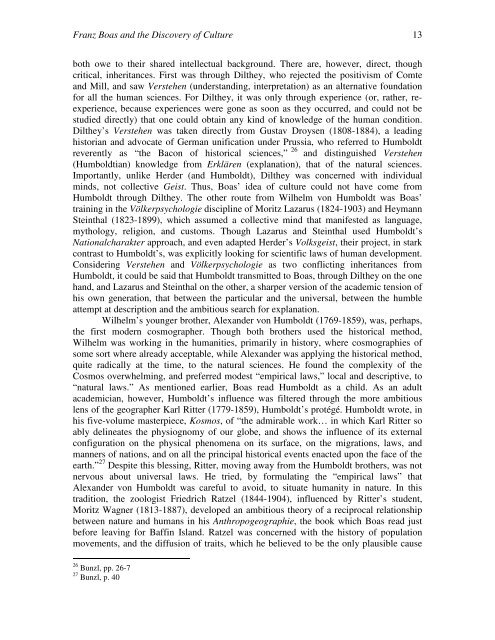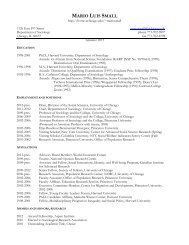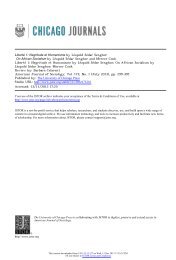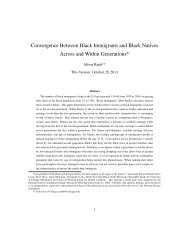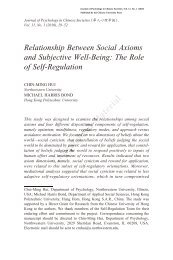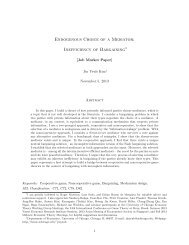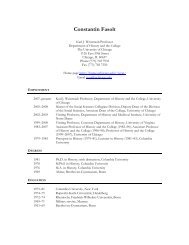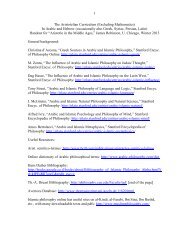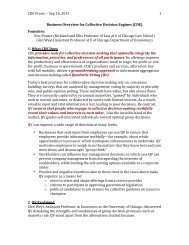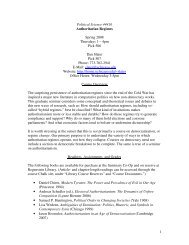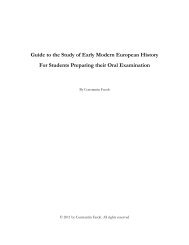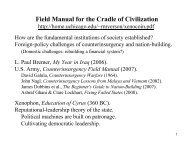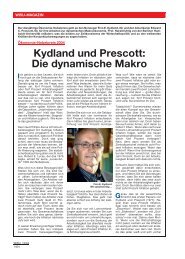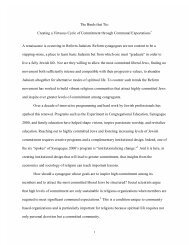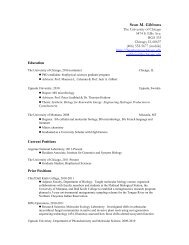Franz Boas and the Discovery of Culture - Personal Web Pages ...
Franz Boas and the Discovery of Culture - Personal Web Pages ...
Franz Boas and the Discovery of Culture - Personal Web Pages ...
You also want an ePaper? Increase the reach of your titles
YUMPU automatically turns print PDFs into web optimized ePapers that Google loves.
<strong>Franz</strong> <strong>Boas</strong> <strong>and</strong> <strong>the</strong> <strong>Discovery</strong> <strong>of</strong> <strong>Culture</strong> 13<br />
both owe to <strong>the</strong>ir shared intellectual background. There are, however, direct, though<br />
critical, inheritances. First was through Dil<strong>the</strong>y, who rejected <strong>the</strong> positivism <strong>of</strong> Comte<br />
<strong>and</strong> Mill, <strong>and</strong> saw Verstehen (underst<strong>and</strong>ing, interpretation) as an alternative foundation<br />
for all <strong>the</strong> human sciences. For Dil<strong>the</strong>y, it was only through experience (or, ra<strong>the</strong>r, reexperience,<br />
because experiences were gone as soon as <strong>the</strong>y occurred, <strong>and</strong> could not be<br />
studied directly) that one could obtain any kind <strong>of</strong> knowledge <strong>of</strong> <strong>the</strong> human condition.<br />
Dil<strong>the</strong>y’s Verstehen was taken directly from Gustav Droysen (1808-1884), a leading<br />
historian <strong>and</strong> advocate <strong>of</strong> German unification under Prussia, who referred to Humboldt<br />
reverently as “<strong>the</strong> Bacon <strong>of</strong> historical sciences,” 26 <strong>and</strong> distinguished Verstehen<br />
(Humboldtian) knowledge from Erklären (explanation), that <strong>of</strong> <strong>the</strong> natural sciences.<br />
Importantly, unlike Herder (<strong>and</strong> Humboldt), Dil<strong>the</strong>y was concerned with individual<br />
minds, not collective Geist. Thus, <strong>Boas</strong>’ idea <strong>of</strong> culture could not have come from<br />
Humboldt through Dil<strong>the</strong>y. The o<strong>the</strong>r route from Wilhelm von Humboldt was <strong>Boas</strong>’<br />
training in <strong>the</strong> Völkerpsychologie discipline <strong>of</strong> Moritz Lazarus (1824-1903) <strong>and</strong> Heymann<br />
Steinthal (1823-1899), which assumed a collective mind that manifested as language,<br />
mythology, religion, <strong>and</strong> customs. Though Lazarus <strong>and</strong> Steinthal used Humboldt’s<br />
Nationalcharakter approach, <strong>and</strong> even adapted Herder’s Volksgeist, <strong>the</strong>ir project, in stark<br />
contrast to Humboldt’s, was explicitly looking for scientific laws <strong>of</strong> human development.<br />
Considering Verstehen <strong>and</strong> Völkerpsychologie as two conflicting inheritances from<br />
Humboldt, it could be said that Humboldt transmitted to <strong>Boas</strong>, through Dil<strong>the</strong>y on <strong>the</strong> one<br />
h<strong>and</strong>, <strong>and</strong> Lazarus <strong>and</strong> Steinthal on <strong>the</strong> o<strong>the</strong>r, a sharper version <strong>of</strong> <strong>the</strong> academic tension <strong>of</strong><br />
his own generation, that between <strong>the</strong> particular <strong>and</strong> <strong>the</strong> universal, between <strong>the</strong> humble<br />
attempt at description <strong>and</strong> <strong>the</strong> ambitious search for explanation.<br />
Wilhelm’s younger bro<strong>the</strong>r, Alex<strong>and</strong>er von Humboldt (1769-1859), was, perhaps,<br />
<strong>the</strong> first modern cosmographer. Though both bro<strong>the</strong>rs used <strong>the</strong> historical method,<br />
Wilhelm was working in <strong>the</strong> humanities, primarily in history, where cosmographies <strong>of</strong><br />
some sort where already acceptable, while Alex<strong>and</strong>er was applying <strong>the</strong> historical method,<br />
quite radically at <strong>the</strong> time, to <strong>the</strong> natural sciences. He found <strong>the</strong> complexity <strong>of</strong> <strong>the</strong><br />
Cosmos overwhelming, <strong>and</strong> preferred modest “empirical laws,” local <strong>and</strong> descriptive, to<br />
“natural laws.” As mentioned earlier, <strong>Boas</strong> read Humboldt as a child. As an adult<br />
academician, however, Humboldt’s influence was filtered through <strong>the</strong> more ambitious<br />
lens <strong>of</strong> <strong>the</strong> geographer Karl Ritter (1779-1859), Humboldt’s protégé. Humboldt wrote, in<br />
his five-volume masterpiece, Kosmos, <strong>of</strong> “<strong>the</strong> admirable work… in which Karl Ritter so<br />
ably delineates <strong>the</strong> physiognomy <strong>of</strong> our globe, <strong>and</strong> shows <strong>the</strong> influence <strong>of</strong> its external<br />
configuration on <strong>the</strong> physical phenomena on its surface, on <strong>the</strong> migrations, laws, <strong>and</strong><br />
manners <strong>of</strong> nations, <strong>and</strong> on all <strong>the</strong> principal historical events enacted upon <strong>the</strong> face <strong>of</strong> <strong>the</strong><br />
earth.” 27 Despite this blessing, Ritter, moving away from <strong>the</strong> Humboldt bro<strong>the</strong>rs, was not<br />
nervous about universal laws. He tried, by formulating <strong>the</strong> “empirical laws” that<br />
Alex<strong>and</strong>er von Humboldt was careful to avoid, to situate humanity in nature. In this<br />
tradition, <strong>the</strong> zoologist Friedrich Ratzel (1844-1904), influenced by Ritter’s student,<br />
Moritz Wagner (1813-1887), developed an ambitious <strong>the</strong>ory <strong>of</strong> a reciprocal relationship<br />
between nature <strong>and</strong> humans in his Anthropogeographie, <strong>the</strong> book which <strong>Boas</strong> read just<br />
before leaving for Baffin Isl<strong>and</strong>. Ratzel was concerned with <strong>the</strong> history <strong>of</strong> population<br />
movements, <strong>and</strong> <strong>the</strong> diffusion <strong>of</strong> traits, which he believed to be <strong>the</strong> only plausible cause<br />
26 Bunzl, pp. 26-7<br />
27 Bunzl, p. 40


